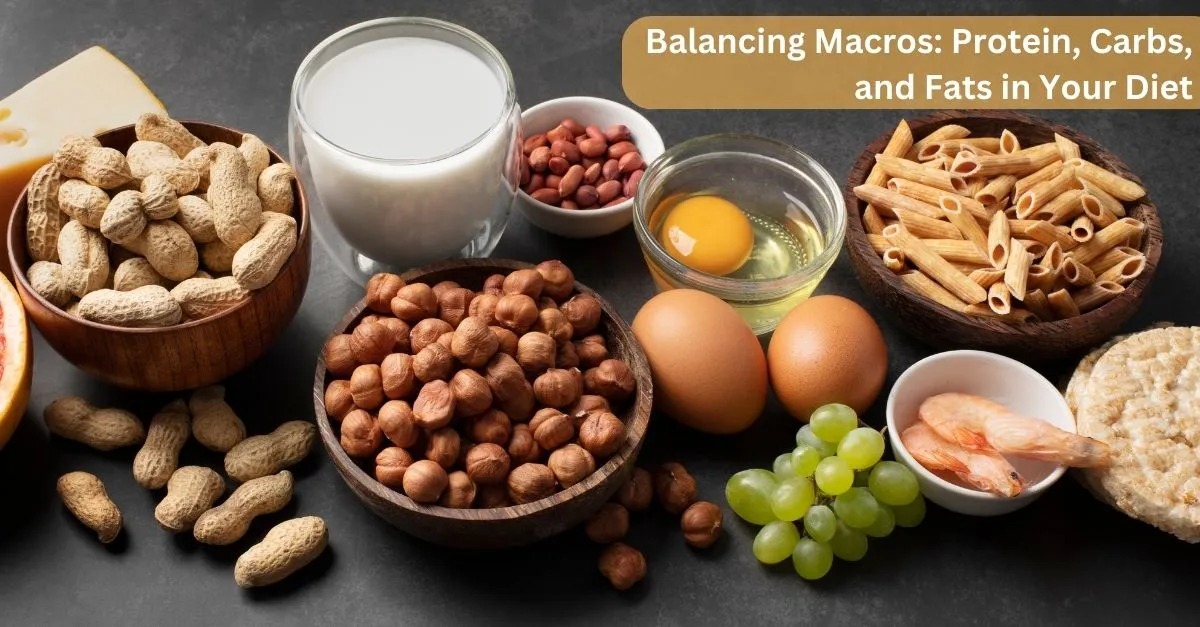Health
Balancing Macronutrients: How Carbs, Protein, and Fat Affect Energy and Performance
Published
4 months agoon
By
Prime Star
Introduction
Every bite of food we consume contains more than just calories—it contains information that shapes our health, performance, and longevity. Among all nutrients, macronutrients—carbohydrates, protein, and fat—stand as the foundation of human nutrition. They supply energy, build tissues, regulate metabolism, and influence everything from mental clarity to athletic performance. But while most people understand their basic roles, far fewer recognize the importance of balance. Consuming the right type and ratio of macronutrients can make the difference between fatigue and vitality, between sluggish recovery and peak performance.
This article explores how each macronutrient contributes to energy and performance, what happens when they fall out of balance, and how individuals can tailor their intake to meet their unique needs. From athletes to office workers, the principles of balancing carbohydrates, protein, and fat apply universally, yet in different ways depending on lifestyle and goals.
Carbohydrates: The Body’s Preferred Fuel
Carbohydrates are the body’s quickest and most efficient energy source. Once consumed, they are broken down into glucose, which fuels muscles, the brain, and other organs.
Energy Supply and Glycogen Stores
“The body stores glucose as glycogen in the liver and muscles. During exercise, especially high-intensity activity, glycogen becomes the go-to energy source. When glycogen stores are depleted, fatigue sets in, often described by athletes as hitting the wall.” adds Ben Flynn, Marketing Manager at 88Vape
Cognitive Function
The brain consumes about 20% of the body’s energy despite being only 2% of body weight, and it runs almost entirely on glucose. Low-carb diets or fasting can impair memory, focus, and decision-making in some individuals, though the brain can adapt to ketones under carbohydrate restriction.
Quality of Carbohydrates
- Complex carbs: Whole grains, legumes, and vegetables provide sustained energy through slower digestion and fiber content.
- Simple carbs: Refined sugars and processed foods spike blood glucose rapidly, leading to energy crashes and cravings.
A balanced diet prioritizes complex carbohydrates to stabilize energy while using simple carbs strategically for quick boosts—such as before or after intense workouts.
Protein: The Builder and Repairer
Protein is often associated with muscle, but its role extends far beyond. Made of amino acids, protein is essential for tissue repair, enzyme production, hormone regulation, and immune function.
Muscle Repair and Growth
Exercise causes micro-tears in muscle fibers. Protein provides the amino acids needed to repair these tears, resulting in stronger muscles. Without sufficient protein, recovery slows, and muscle breakdown can outpace repair.
Satiety and Weight Management
Protein is the most satiating macronutrient. Meals rich in protein reduce hunger hormones and increase feelings of fullness, which helps with weight management. Additionally, protein has a high thermic effect, meaning the body burns more calories digesting it compared to carbs or fat.
Beyond Muscles: Whole-Body Benefits
- Enzymes and hormones are made of proteins, enabling vital biochemical reactions.
- Antibodies, essential for immunity, rely on adequate protein intake.
- Hair, skin, and nails are protein-based structures, highlighting its importance beyond internal systems.
For performance, protein ensures that the body can adapt to stress, recover efficiently, and maintain lean mass even during calorie restriction.
Fats: The Sustained Energy Source
For decades, dietary fat was vilified. Today, research highlights that fat is not the enemy but an essential macronutrient for health and performance.
Energy Density and Endurance
Fat provides more than twice the energy of carbs or protein—9 calories per gram compared to 4. This makes it the body’s long-burning fuel, particularly useful during low- to moderate-intensity activity, such as walking, hiking, or endurance sports.
Hormone Production and Brain Health
Fats are necessary for producing hormones like testosterone, estrogen, and cortisol. They also support brain function—nearly 60% of the brain is composed of fat, particularly omega-3 fatty acids, which influence memory, learning, and mood.
Types of Fat
- Healthy fats: Monounsaturated fats (olive oil, avocados) and polyunsaturated fats (omega-3s from fish, flaxseeds) reduce inflammation and support heart health.
- Unhealthy fats: Trans fats and excessive saturated fats increase cardiovascular risks.
The right balance of fats promotes stable energy, supports recovery, and reduces chronic disease risk, whereas deficiencies can impair hormonal and neurological function.
Why Balance Matters
Consuming macronutrients in isolation or extremes often leads to suboptimal performance and health issues.
- Too few carbs: Leads to glycogen depletion, fatigue, and reduced brain function.
- Too little protein: Causes muscle loss, poor recovery, and weakened immunity.
- Too little fat: Disrupts hormone balance, impairs brain function, and reduces nutrient absorption.
Balance ensures that the body has immediate energy from carbs, structural support and repair from protein, and long-term fuel and regulation from fat.
Macronutrient Ratios: One Size Doesn’t Fit All
The “ideal” macronutrient ratio varies depending on activity levels, goals, and individual physiology.
General Recommendations
The Acceptable Macronutrient Distribution Range (AMDR) suggests:
- Carbohydrates: 45–65% of total daily calories
- Protein: 10–35%
- Fat: 20–35%
However, within these ranges, customization matters.
Athletes and Active Individuals
- Higher carb intake supports glycogen replenishment.
- Moderate protein enhances recovery.
- Healthy fats sustain energy for endurance.
Office Workers or Sedentary Adults
- Moderate carbs to prevent energy crashes.
- Higher protein for satiety and weight management.
- Balanced fats for brain function and long-term health.
Older Adults
- Increased protein to combat muscle loss (sarcopenia).
- Healthy fats to support cognitive health.
- Controlled carbs to reduce the risk of insulin resistance.
Popular Diet Comparisons
- Keto: High fat, very low carb—may improve fat metabolism but risks carb depletion.
- Mediterranean: Balanced macronutrients with emphasis on healthy fats and whole foods—shown to reduce heart disease risk.
- High-Protein Diets: Useful for weight management but must balance with carbs and fats to avoid long-term strain.
Macronutrients and Performance in Real Life
Physical Performance
- Endurance sports: Rely on both carbs (short bursts) and fats (long duration).
- Strength training: Requires protein for recovery and carbs for glycogen.
- Mixed activities: A balanced diet ensures adaptability.
Cognitive Performance
“Carbs fuel focus, protein supports neurotransmitters like dopamine and serotonin, and fats protect brain structure. A diet lacking balance often manifests as brain fog, irritability, or poor memory.” adds Emily Peterson, CEO of Saranoni
Emotional and Mental Health
Emerging research connects macronutrient balance to mood regulation. Omega-3s reduce depression risk, while protein supports serotonin production. Conversely, diets heavy in refined carbs and low in protein or healthy fats often increase anxiety and fatigue.
Practical Tips for Balancing Macronutrients
- Build balanced plates: Include a lean protein, complex carb, and healthy fat at each meal.
- Prioritize whole foods: Choose unprocessed sources like whole grains, legumes, lean meats, nuts, and vegetables.
- Use portion guides: A palm-sized portion of protein, a cupped hand of carbs, and a thumb-sized portion of fats works as a simple rule of thumb.
- Adjust for activity: Add more carbs before intense workouts, and more protein post-exercise for recovery.
- Listen to your body: Energy crashes, cravings, or fatigue often signal an imbalance.
Conclusion
Balancing macronutrients is more than counting calories—it’s about understanding how carbs, protein, and fat fuel the body and mind in unique yet interconnected ways. Carbs provide quick energy and cognitive support, protein builds and repairs tissues, and fat ensures long-term energy, hormonal stability, and brain health. The right balance depends on individual goals, but universally, diversity and quality matter more than strict adherence to any single ratio.
In a world filled with dietary fads and extremes, the timeless truth remains: balance leads to performance, resilience, and longevity. By aligning macronutrient intake with lifestyle demands, anyone—from athletes to professionals—can optimize their energy, enhance their performance, and secure better long-term health.

3 Surprising Upgrades to Boost Comfort at Home

3 Surprising Ways Golf Simulators Transform Home Sport

3 Ways First Responders Protect Gear, Accelerate Response

3 Essential Tech Upgrades Transforming Modern Office Safety

3 Proven Tech Essentials for Healthy Travellers 2026

3 Surprising Tech Picks for Budget-Strapped SMEs

Tips and Tricks for First-Date Men’s Fashion in 2026

Call My Doctor Health Care LLC Sets a New Standard for Home Healthcare in Dubai

StableProxy Review: What Is It and Why You Might Need It in 2026

Recording Apps: Best Picks for Audio Capture in Screen Recording (2026 Guide)

Who Is Marlene Knaus? The Untold Story of Niki Lauda’s First Wife

Jacqueline Bernice Mitchell: The Inspiring Story of Jerry Rice’s Ex-Wife

Curious About JOI Database? Read This First Before You Click Anything

Mickey Middleton: The Untold Story of Bryan Cranston’s First Wife

Where Is Barbara Boothe Now? Inside Her Life After Larry Ellison

Wendy Lang: Meet the Therapist Married to Cenk Uygur

Alisande Ullman Today: What Happened After Her Divorce from Leslie Nielsen?

Where Is Noelle Watters Now? Jesse Watters’ Ex-Wife’s Life After Divorce

Should You Use Wooflix in 2025? Honest Review and Best Alternatives

Where Is Tanya Hijazi Now?: All About Rick James’ Former Wife

3 Surprising Upgrades to Boost Comfort at Home

3 Surprising Ways Golf Simulators Transform Home Sport

3 Ways First Responders Protect Gear, Accelerate Response

3 Essential Tech Upgrades Transforming Modern Office Safety

3 Proven Tech Essentials for Healthy Travellers 2026

3 Surprising Tech Picks for Budget-Strapped SMEs

Tips and Tricks for First-Date Men’s Fashion in 2026

Call My Doctor Health Care LLC Sets a New Standard for Home Healthcare in Dubai

StableProxy Review: What Is It and Why You Might Need It in 2026

Recording Apps: Best Picks for Audio Capture in Screen Recording (2026 Guide)
Categories
Trending
-

 Celebrity8 months ago
Celebrity8 months agoWho Is Marlene Knaus? The Untold Story of Niki Lauda’s First Wife
-

 Celebrity5 months ago
Celebrity5 months agoJacqueline Bernice Mitchell: The Inspiring Story of Jerry Rice’s Ex-Wife
-

 Entertainment6 months ago
Entertainment6 months agoCurious About JOI Database? Read This First Before You Click Anything
-

 Celebrity6 months ago
Celebrity6 months agoMickey Middleton: The Untold Story of Bryan Cranston’s First Wife
